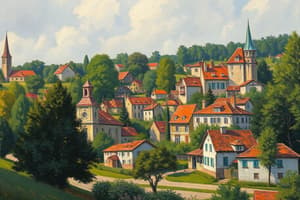Podcast
Questions and Answers
What is a key characteristic of rural communities?
What is a key characteristic of rural communities?
- Low population density compared to urban areas (correct)
- Abundance of job opportunities within the community
- High-rise buildings and apartment living
- Limited access to nature and outdoor activities
Which type of community is likely to have residents living closer to nature?
Which type of community is likely to have residents living closer to nature?
- Rural communities (correct)
- Virtual communities
- Urban communities
- Suburban communities
In what type of community are cultural events and local traditions central to community life?
In what type of community are cultural events and local traditions central to community life?
- Urban communities
- Virtual communities
- Suburban communities
- Rural communities (correct)
Which type of community typically has high population density and diverse cultural offerings?
Which type of community typically has high population density and diverse cultural offerings?
What is a defining feature of urban communities?
What is a defining feature of urban communities?
Which type of community is likely to have longer commutes due to fewer job opportunities within the community?
Which type of community is likely to have longer commutes due to fewer job opportunities within the community?
What is a key characteristic of suburban communities?
What is a key characteristic of suburban communities?
Which challenge is commonly associated with urban areas?
Which challenge is commonly associated with urban areas?
What is a benefit of virtual communities?
What is a benefit of virtual communities?
Which type of community allows for easy formation around any interest?
Which type of community allows for easy formation around any interest?
What differentiates suburban communities from urban areas?
What differentiates suburban communities from urban areas?
What characterizes virtual communities?
What characterizes virtual communities?
Flashcards
Rural Community
Rural Community
A community located outside major cities with a population typically under 5,000, often featuring small towns and villages.
Urban Community
Urban Community
A densely populated area within cities and metropolitan regions, offering high population density and diverse cultural experiences.
Suburban Community
Suburban Community
A community located between cities and rural areas, mostly with single-family homes on larger plots of land, offering green spaces.
Virtual Community
Virtual Community
Signup and view all the flashcards
Population Density (Rural)
Population Density (Rural)
Signup and view all the flashcards
Population Density (Urban)
Population Density (Urban)
Signup and view all the flashcards
Job Opportunities (Rural)
Job Opportunities (Rural)
Signup and view all the flashcards
Job Opportunities (Urban)
Job Opportunities (Urban)
Signup and view all the flashcards
Study Notes
Types of Communities
Communities play a crucial role in shaping our social, economic, and cultural lives. They can vary significantly based on their location, size, and characteristics. In this article, we will explore three main types of communities: rural, urban, suburban, and virtual.
Rural Communities
Rural communities encompass those located outside of major cities with populations typically under 5,000. These areas often feature small towns and villages, where residents live closer to nature due to the open spaces available for farming, hunting, fishing, and outdoor recreation. Here are some key characteristics of rural communities:
- Population density is lower compared to urban areas.
- Residents may have fewer job opportunities within the community, leading to longer commutes.
- Cultural events and local traditions often play a central role in community life.
- Reliance on nature for resources and livelihoods creates a strong sense of connection among residents.
Urban Communities
Urban communities refer to densely populated areas within cities and metropolitan regions. Here, people live in close proximity to one another, with high population densities and diverse cultural offerings. Some defining features of urban communities include:
- High population density, with many people living in apartment buildings and other multi-unit dwellings.
- Greater access to employment, education, and entertainment opportunities within the city.
- Diverse cultural experiences due to the presence of various ethnic groups, religions, and lifestyles.
- Challenges such as traffic congestion, pollution, and higher living costs.
Suburban Communities
Suburban communities are located between cities and rural areas. They usually feature single-family homes on larger plots of land and are characterized by:
- Lower population densities compared to urban areas.
- Greater access to green spaces and nature.
- Various employment, education, and entertainment opportunities within the community.
- A sense of community and safety, with residents often having a strong connection to their neighbors and local schools.
Virtual Communities
Virtual communities are those where individuals share common interests, values, and experiences through online platforms and social media. These communities offer numerous advantages, such as:
- Accessibility: People from anywhere in the world can join virtual communities.
- Diversity: Virtual communities can be formed around any interest, making it easier for individuals to find like-minded people.
- Flexibility: Members can engage with the community at their own pace and convenience.
- Global networking opportunities.
In conclusion, the types of communities we live in shape our experiences and influence our lives in various ways. Understanding these differences can help us appreciate the unique qualities of each community and foster greater empathy and understanding among residents.
Studying That Suits You
Use AI to generate personalized quizzes and flashcards to suit your learning preferences.




